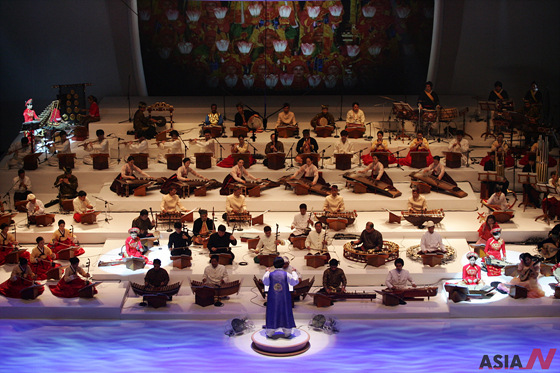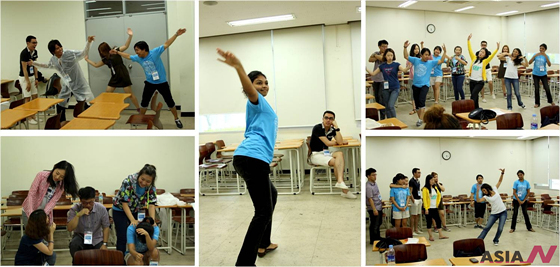The Future of Asian culture
At the turn of the 21st century, the world began to turn its primary attention away from quantitative growth and to focus on culture, which is conducive to improving the quality of life. Asia accounts for 30 percent of the world’s land mass and is home to 52 percent of the global population. With its numerous ethnic groups, Asia has a wide spectrum of culture and traditions. Because of this, Asia abounds in rich cultural resources. It is evidenced today by the fact that the economic and cultural axis of the world is shifting toward Asia. Asian culture is analogous to crude oil or unprocessed gemstones. It is truly a great asset for humanity.
The cultural resources of Asia, however, have been outshined by Western culture and never been properly utilized. Worse yet, Asia has been interpreted only from the perspective of the West, not from that of Asians themselves. In this context, it is necessary to take a more appropriate approach to correctly understand Asian culture. Asians need to carve out a future that will further advance Asian culture through harmonious, mutually supportive relations within Asia based on culture.
Asia is the place where diverse religions, ethnic groups and cultures coexist and mingle. Geographically, Asia is one, but the cultural geography is characterized by a wide variety of regional traits. More than anything else, there are abundant archetypes of traditional cultures which have been passed down over a long period of time and which have great cultural value.
The Ministry of Culture, Sports and Tourism of the Republic of Korea formulated a project to promote such diverse Asian cultures throughout the world. To give concrete shape to the plan, the Ministry has been constructing a space that will serve as an inspirational center for Asian artists and content creators. That is the Hub City of Asian Culture, which has been under construction in Gwangju city since 2004. The Hub City of Asian Culture is designed to provide a venue for the study of Asian culture and its origins from the perspective of Asians and for the development of it as cultural content. By doing so, Asian culture will be further promoted around the world.
Some other culture city projects have pursued the rejuvenation of specific cities. In the meantime, the Hub City of Asian Culture Project is aimed at improving the image of Asia and enhancing cultural potential by promoting coexistence and coprosperity of Asian countries.
Of particular importance is the fact that the concept of this hub city does not mean the concentration of abilities that can be used for hegemonic purposes. Rather, it refers to a hub that facilitates communication and exchanges. By utilizing the cultural resources of Asian countries as an original source and gaining a better understanding of other cultures in the process of working together through cultural exchanges, the hub city will be able to create new cultural content by combining the strengths of our culture and those of other Asian nations.
In a nutshell, culture plays a key role, and Asian cultural values should be highlighted. The Asian Culture Complex, which will be opened in 2014, will play a pivotal role in such endeavors.
As the core facility of the Hub City of Asian Culture Project, the Asian Culture Complex is now under construction in Gwangju City at the site where the old provincial government building of South Jeolla Province once stood. The complex will collect cultural content of other Asian countries and be used as a space for creative activities. The creative cultural energies of Asia will be disseminated throughout the rest of the world via this complex.
To this end, research into cultural content is being carried out through cultural exchanges with other Asian countries, which leads to the development of new cultural content. Such efforts have already come to fruition: The ASIA Traditional Orchestra had its first public performance in 2009, and Asian Culture Week was held in August this year for the first time. The ASIA Traditional Orchestra made its debut at the Korea-ASEAN Commemorative Summit held on May 31, 2009. Composed of musicians playing 52 traditional instruments from 10 Asian countries, the orchestra has held a concert every year since then and brought Asian peoples together through music. Every concert so far has struck a chord with many people around the world. This year was also not an exception. Held at the Sejong Center for the Performing Arts in Seoul in remembrance of Korea’s Liberation Day on August 15, the concert drew enthusiastic applause.
From August 22 to 28, the first Asian Culture Week took place in Gwangju. The Culture Week featured diverse genres of music, art, film, dance and literature with many young people, artists, specialists, scholars and the general public attending. Their activities were very rewarding in that Asians from various countries were able to deepen their understanding of the cultures of the other participants, breaking down whatever cultural bias they might have had. It was fortunate that the participants were able to reach a kind of consensus on the need to advance a common culture conducive to the enhancement of coexistence and the quality of life of all.
Specific events included the Asian Youth Culture Festival and the World Music Festival as well as a performance by the Asian Children’s Choir and a symposium of the Asian Art Space Network. The Asian Youth Culture Festival featured an Asian Youth Forum and an Asian Youth Culture Fair. These programs were successful in removing cultural barriers and generating discussions on the common future of young people. The high school boys and girls from 26 countries were quite enthusiastic about introducing the unique aspects of their own cultures. They also jointly produced works of music, dance and film. Participating in the Children’s Choir were 50 boys and girls from bicultural families in Korea who have one parent from another Asian country. Their performances delivered a resounding message of hope, peace, harmony and friendship among all peoples in Asia. The Asian Art Space Network featured artistic exhibitions and a debate among artists from various countries on the environment of creative arts in the region. Inspired by the success of the first Asian Culture Week, organizers of the events plan to regularize their gatherings on an annual basis and expand the genres and countries to be represented.
In the years to come, culture promises to be the main engine pulling the advancement of Asia as a whole. Considering the similarity of the roots of Asian countries, there is a good prospect for them to achieve meaningful communication and exchanges through constant efforts. In this way, we will be able to further promote mutual understanding, cooperation and friendship, forging ahead together smoothly. When Asia continues to maintain and solidify its identity through cultural interaction, the future of Asia will be brighter than any other continent.


























































Asia is the hub of culture !!
I am very glad to read this article by the former Minister of Culture. Sports and Tourism of the Republic of Korea. I am the former Co-Chair of the ASEAN Korea Traditional Orchestra. This is a great initiative on the part of Korea. I hope there will be serious research and development running parallel to the events at the Hub City for the Asian Arts, as I agree with Mr. Choung, the non-Western arts are disadvantage, not in content, but in conceptual understanding of its elements. Much work is needed to address this problem. Good Luck and Keep the Good Work Going. Joe Peters
You’re right and wrong: there are lots of foreigners who don’t like Korea, but it’s often bcsuaee they’re selfish and believe that Korea should adapt to them, not vice versa.I do enjoy living in Korea, though, and I have more videos on the way. Hope you’ve subscribed to my youtube channel!